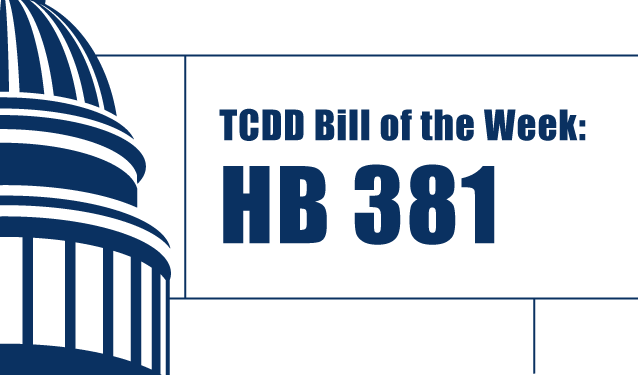HB 381
HB 381

For this weekly feature, the Texas Council for Developmental Disabilities (TCDD) profiles a noteworthy bill that is going through the legislative process. The bill may relate directly to TCDD’s Public Policy Priorities or another disability-related issue.
Table of Contents
Bill: House Bill (HB) 381, relating to the applicability of the death penalty to a capital offense committed by a person with an intellectual disability.
Bill Author: Rep. Senfronia Thompson, House District 141 (Houston)
What does the bill do?
HB 381 would amend the Criminal Procedure Code to prohibit the use of the death penalty on defendants with intellectual disabilities. The bill defines “intellectual disability” as “significantly subaverage general intellectual functioning that is concurrent with deficits in adaptive behavior and originates during the developmental period.”
The bill further defines the terms, “deficits in adaptive behavior,” “developmental period,” and “significantly subaverage general intellectual functioning.”
HB 381 lays out a process to determine a defendant’s intellectual disability. Under the terms of the bill, the attorney for the defendant in a capital case may request in writing that the judge hearing the case hold a determination hearing. This request has some requirements:
- It must occur no later than one year after the defendant’s indictment.
- The judge must hold a hearing at least 180 days after the written request was submitted.
- The hearing must take place at least 120 days before the date the trial is scheduled to begin.
If a request is submitted beyond the deadline, the judge may hold a determination hearing if the attorney can show good cause for not filing a request within the time limit. The hearing may not be held before a jury that is empaneled in the case.
The bill includes the appointment of an independent expert experienced and qualified in the field of diagnosing intellectual disabilities to examine the defendant. The judge may order the defendant to be examined, and the examination must be narrowly tailored to determine whether the defendant has an intellectual disability.
At a determination hearing, the burden is on the defendant to prove with evidence that the defendant is a person with an intellectual disability, and the state may offer evidence to rebut evidence offered by the defendant. Any evidence offered must be consistent with medical standards for the diagnosis of intellectual disabilities.
The judge will impanel a jury to determine whether the defendant is a person with an intellectual disability, and the jury’s verdict must be unanimous. A defendant may, with the consent of the state, waive the jury hearing and instead ask for a determination hearing by a judge. In this instance, a hearing will be held by the judge outside the presence of a jury. No later than 30 days after the hearing, the judge will determine whether the defendant is a person with an intellectual disability and issue an appropriate order. The order must contain findings of fact explaining the judge’s reasoning for the determination and citing evidence in the record.
If the hearing by the jury or the judge finds that the defendant is not a person with an intellectual disability, then the trial will proceed without any mention of the determination hearing, though the defense may still present evidence of intellectual disability.
If the state appeals an order related to a determination of intellectual disability, it is to be considered a direct appeal to the Texas Court of Criminal Appeals, which will hastily review the matter.
If passed, HB 381 would take effect on Sept. 1, 2023. It would apply only to trials that take place on or after the effective date, regardless of whether the alleged offense was committed before, on, or after that date.
Background information
In Atkins v. Virginia, the U.S. Supreme Court ruled that it is unconstitutional under the 8th Amendment to seek the death penalty for individuals with intellectual disabilities. However, this ruling left the burden upon the states to determine what constitutes a disability and when to address it within court procedures.
The U.S. Supreme Court later ruled in Moore v. Texas that the Texas Court of Criminal Appeals relies on outdated medical standards for determining intellectual disability. Judges on the Court of Criminal Appeals argue that they have been left on their own to develop criteria for such determination, and have pleaded with the Texas Legislature to come up with a standardized protocol to do so. HB 381 would address this need.
Statement from Rep. Senfronia Thompson, bill author:

Statement from Rep. Senfronia Thompson, bill author:

“Each death penalty case in Texas costs taxpayers millions of dollars. The procedures in this bill will save time, money, protect the state’s interests, and ensure that we are consistent with constitutional standards.”
Where is the bill in the process?
On Feb. 28, 2023, HB 381 received a public hearing before the House Committee on Criminal Jurisprudence. You can watch the discussion on the bill here, beginning at the 52:20 mark.
The bill was favorably reported by the committee on a vote of 9-0. It now moves to the Calendars Committee, where it awaits scheduling for consideration by the full Texas House.
Who supports the bill and why?
The following comments were provided during the bill’s public hearing on Feb. 28:
- The Arc of Texas: Kirk Noaker, a former county magistrate judge who serves on the Judicial Commission on Mental Health, spoke on behalf of the Arc of Texas in favor of the bill. “HB 381 codifies in Texas law what the United States Supreme Court has already decided three times,” he stated. “It aligns Texas law and procedures with the Supreme Court’s mandates and establishes consistent standards across the state.”
- Texas Catholic Conference: Jennifer Allmon, executive director of the Texas Catholic Conference of Bishops, testified in support of the bill. She mentioned other individuals’ comments that HB 381 saves time and money, and continued, “the other really important thing that this saves is grief and pain for the families involved in this process, whether it’s the victim’s family or the accused’s family, to have to go through this process. Doing it pre-trial gives a level of certainty, in advance, and that helps families deal with the process.”
Disability Rights Texas also registered its support for the bill but provided no in-person testimony. In past sessions, similar legislation has been supported by the American Civil Liberties Union of Texas, Coalition of Texans with Disabilities, National Alliance on Mental Illness Texas, National Association of Social Workers – Texas Chapter, Texas Fair Defense Project, Texas Impact, Texas NAACP, Texas Psychological Association, and others.
Additional testimony
The following comments were provided at the Feb. 28 hearing:
- TCDD: Sabrina Gonzalez Saucedo, a public policy analyst for TCDD, submitted written testimony on the bill. She explained how the Supreme Court found that the method Texas is currently using to determine intellectual disability is, “antiquated, outdated, and not based in science.” She noted that HB 381 would create a necessary framework and, “help ensure that defendants with [intellectual disabilities] receive impartial justice when being tried in capital cases.”
- UT Law School: Raoul Schonemann, a clinical professor at The University of Texas School of Law and co-director of the Capital Punishment Center, provided testimony on the bill. He indicated that the Texas Court of Criminal Appeals, “issued a published opinion calling on the Legislature to enact a statutory procedure for determination of intellectual disability prior to trial.” He further stated that, of the states that still allow the death penalty, Texas is possibly the only one that has yet to develop such a procedure. “As a result of no statutory scheme, the courts have been left to fashion their own procedures, and that has resulted—particularly when this has been left up to individual trial judges—in a chaotic array of varying procedures, which is really the unacceptable way of determining whether somebody is constitutionally exempt from a capital trial and a death sentence.”
Who opposes the bill and why?
No testimony was provided in opposition to HB 381 at the Feb. 28 hearing.
How much will the bill cost?
The Legislative Budget Board (PDF) determined that HB 381 would not impact the state budget in a significant way.
Is there a Senate companion to the bill?
Sen. Borris Miles has filed Senate Bill (SB) 1353, which is nearly identical to HB 381. It has not yet been referred to a committee.
Share this bill
TCDD created a Bill of the Week one-pager for HB 381 (PDF). This is a simplified explanation of the bill that you can share with your representative and personal network.
Stay informed
For the latest information and status of HB 381, follow the bill on the Texas Legislature Online. To receive future legislative updates from TCDD, subscribe to our newsletter or follow us on Twitter, Facebook, LinkedIn, and Instagr
